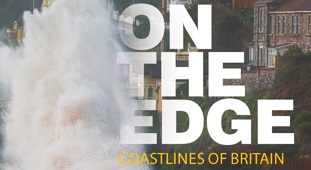‘On the Edge’ – coastal railways at risk from climate change
Published On Mon 23 Mar 2015 by Grant Hill

Footage of a railway line suspended in mid-air and buffeted remorselessly by the storm that had caused the sea wall to collapse beneath it made for one of the defining images of 2014.
Scenes such as those witnessed at Dawlish in Devon are set to become more frequent as a result of climate change and the Government and rail companies must face up to difficult funding decisions if rural areas currently served by coastal lines are to continue to be connected to the rail network. Those are the conclusions of a new book written by an expert in coastal processes from the University of Dundee.
Professor Robert Duck is Dean of the School of the Environment and Professor of Environmental Geoscience at the University. His latest book, On the Edge: Coastlines of Britain, is a unique combination of environmental and historical research, timely given the impact of the storms of January and February 2014 and covers the breaching of the South Devon, Cambrian and Cumbrian coastal lines.
It will be launched at a public lecture given by Professor Duck at the University’s Dalhousie Building from 6-7pm on Thursday, 26th March.
It provides the first in-depth evaluation of the physical impact of railway construction on the British coast and the challenges that Victorian-built infrastructure bring in the 21st century, particularly in Devon, Wales, Cumbria and Ayrshire where rail lines are especially vulnerable.
Professor Duck said, “We wouldn’t have built these railway lines where they are if we had today’s knowledge but when they were built in the mid-nineteenth century the coast offered cheap lands that were relatively flat, with less of the difficulties associated with inland sites.
“What happened at Dawlish was a dramatic example of the problems we face as climate change leads to more storms and exacerbates coastal erosion. Much of our coast has railway lines at the edge forming the first line of defence from the sea. This leads to spectacular scenery for passengers to enjoy but increasing difficulties for franchise operators and Government.”
The building of railways has had a profound but largely ignored physical impact on Britain’s coasts. This book explores the coming of railways to the edge of Britain, the ruthlessness of the companies involved and the transformation of our coasts through the destruction or damage to the environment.
Professor Duck notes the irony of rail being championed as a sustainable means of transport at a time when many lines are increasingly exposed to extreme weather and the very actions associated with their construction have exacerbated the attack by the sea.
Although Professor Duck’s previous book, This Shrinking Land, argued that the UK may have to accept defeat in the fight to save some coastal regions from the ravages of erosion he does not recommend abandoning the routes that prove a lifeline for rural communities.
“There will come a time when the Government simply has to look at the costs associated with rebuilding and bolstering sea walls that railway lines are built above,” he said. “Until now we have always looked for a hard engineering solution but as stormy weather becomes more frequent and more lines become vulnerable that may become unsustainable.
“The time will come when we have to look at alternatives, building inland diversions and re-opening long-closed lines as a way of ensuring that we do not cut off communities without continually paying out vast sums of money to rebuild sea walls.
“This means making difficult decisions about spending that will become increasingly unavoidable. Should we be spending billions on HS2, for example, when there are risks to the existing rail infrastructure or should we be making sure there is a modern and efficient network fit for the 21st century that serves the whole country?”
Free tickets for the lecture and book launch at the University’s Dalhousie Building from 6-7pm on Thursday, 26th March can be obtained at http://coastlinesofbritain.eventbrite.co.uk.
For media enquiries contact:
Grant Hill
Press Officer
University of Dundee
Nethergate, Dundee, DD1 4HN
TEL: 01382 384768
E-MAIL: g.hill@dundee.ac.uk
MOBILE: 07854 953277